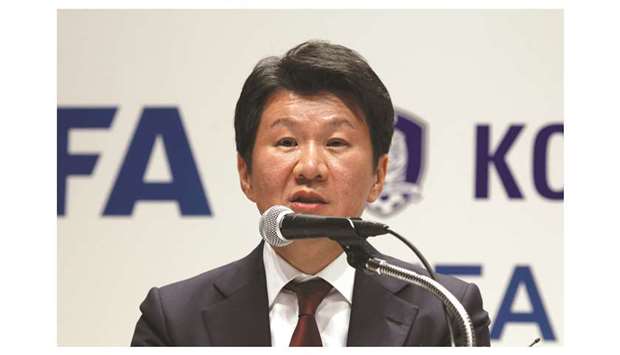Korean Football Association President Chung Mong-gyu believes the 2022 FIFA World Cup will make a positive difference to the long-term development of football due to Qatar’s use of cutting-edge technology.
The FIFA Council member said the stadium cooling technology that Qatar is pioneering will have a positive, long-lasting and far reaching effect not just in the Arab world, but across the Asian continent.
“I believe that technology will be an important element. I am aware that the advanced open air stadium cooling technology at Khalifa International Stadium has received praise from many quarters. A lot of leagues in Asia now have the backing of top corporate houses of those countries – South Korea, China, Japan, and recently India. Qatar’s cooling system might be something these leagues could consider using after 2022 because a lot of matches are scheduled during summer months,” Mong-gyu said.
Mong-gyu has been a vocal supporter of Qatar hosting the 2022 World Cup, which he felt will play a major role in economic transformation in the region. He cited the example of South Korea, which profited from hosting the 2002 World Cup.
“The FIFA World Cup is coming back to Asia after 20 long years – this is good enough reason to support 2022 FIFA World Cup Qatar. I am aware that in addition to football development Qatar, like South Korea in 2002, there are broader objectives of economic transformation within the hosting plans for the 2022 FIFA World Cup. My best wishes to the Government and people of Qatar in their endeavours. If the vision of the Government is backed up by the participation of the public, Qatar will also achieve what South Korea did,” said Mong-gyu, who is also one of the Asian Football Confederation’s (AFC) five Vice Presidents.
Mong-gyu stressed on the importance of home support for a successful organisation of the event, and said it will be a key factor for Qatar’s success as a host. “During the 2002 World Cup, the world admired the passion with which the people of South Korea supported the national team. It is always said that had it not been for the backing of the fans the team would have struggled to qualify from the group.
“Stadiums were full for all the matches and nearly seven million fans flocked to the 20,000-odd giant screens set up across the country to watch our semi-final against Germany. I hope that we will witness similar passion in Qatar for the region’s first ever FIFA World Cup,” he said.
The Korean Football Association president predicted that the Asian football will have further improved by 2022 after their impressive show in the 2018 World Cup in Russia. “In Russia, South Korea created history by becoming the first Asian team to defeat a reigning world champion – and Japan almost made it to the quarter-final. Iran showed their high performance in a very tough group.
“Asian countries can also be optimistic from a historical perspective while preparing for Qatar 2022. In 2002, when the World Cup was hosted by Asia for the first time, and in 2010, when Africa hosted, teams from the home confederations shone. South Korea reached the semi-final in 2002 and Ghana featured in the quarter-final in South Africa,” he noted.
Mong-gyu also shed light on how the football infrastructure, a legacy of the co-hosting of the 2002 FIFA World Cup, been put to use by South Korea. “Most of the 2002 venues were handed over to K League clubs and some of them have staged other marquee sporting events such as the 2014 Asian Games in Incheon and the 2017 FIFA U20 World Cup Korea.
“The Jeonju World Cup Stadium, of course, will occupy a special place in Qatari hearts following Al Sadd’s coronation as Asian champions there in 2011. The 2002 FIFA World Cup also created the opportunity for a generation of our footballers, who came up through the domestic system, to improve their skills by getting exposure in top European leagues. Players like Park Ji-sung, Lee Young-pyo made a mark for their European clubs. Subsequently, Lee Chung-yong, Koo Ja-cheol, Ki Sung-yueong and Son Heung-min have followed in their footsteps,” he said.
Mong-gyu was optimistic of South Korea’s potential to emulate their 2002 performance in 2022. “We have a good chance to do well in Qatar. Leading our attack in Qatar will be Son Heung-min. By 2022, I feel he would have scaled such heights on the European club scene which have even been beyond legends of our continent.”

Korean Football Association president Chung Mong-gyu.
